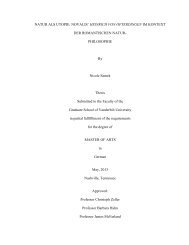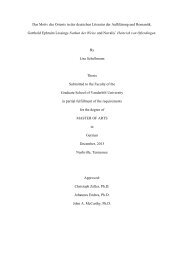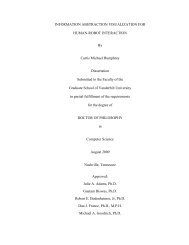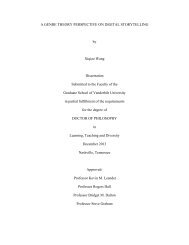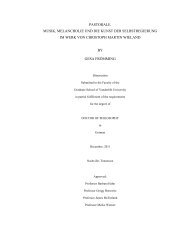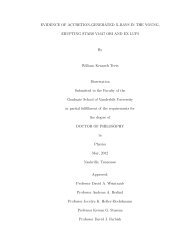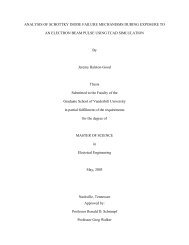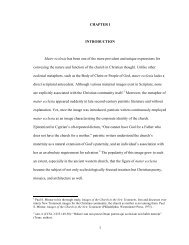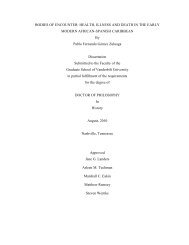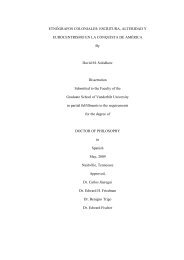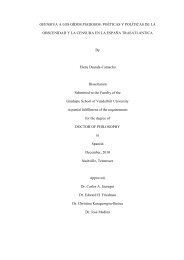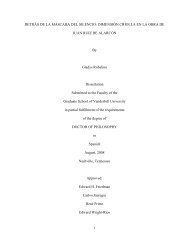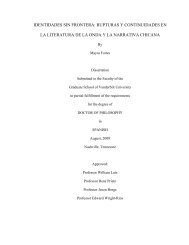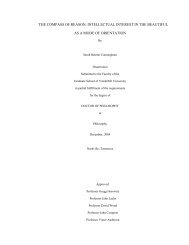THE DEATH OF DIONYSOS - ETD - Vanderbilt University
THE DEATH OF DIONYSOS - ETD - Vanderbilt University
THE DEATH OF DIONYSOS - ETD - Vanderbilt University
You also want an ePaper? Increase the reach of your titles
YUMPU automatically turns print PDFs into web optimized ePapers that Google loves.
From the larger standpoint of the novel, such attention to one’s self is not to be<br />
confused with narrow selfishness or with the greedy pursuit of pleasure or wealth. We<br />
have only to recall the aunt of Serlo and Aurelie, the step-mother of Therese, or even<br />
Wilhelm’s old friend Werner: all of whose narrow self-interest leads to compulsive<br />
behaviors and to an unattractive person and personality. What they lack is an aesthetic<br />
self-consciousness that might organize and lend coherence to their person and personality.<br />
The example of Werner even shows up late in novel, as though to make just that point.<br />
Skinny, bald and pale, Werner is described as “ein arbeitsamer Hypochondrist”, what we<br />
today would call a workaholic (499). Wilhelm, on the other hand–even if his self-<br />
confidence has taken a beating since he met the impressive Lothario and his impressive<br />
friends–elicits words of admiration from his always busy and profit-driven friend: “‘Deine<br />
Augen sind tiefer, deine Stirne ist breiter, deine Nase feiner und dein Mund liebreicher<br />
geworden. Seht nur einmal, wie er steht! wie das alles paßt und zusammenhängt! Wie<br />
doch das Faulenzen gedeihet!’” (Ibid.). [“‘Your eyes are more deep set, your forehead is<br />
broader, your nose is more delicate and your mouth is much more pleasant. Look at how<br />
you stand! How well everything fits together! Indolence makes one prosper’” (EAB 306,<br />
my italics).] Given that activity or Tätigkeit is the superlative value of the Tower,<br />
Wilhelm despairs more than once over his meager accomplishments and qualifications.<br />
The reader, identifying as expected with the hero, may at times share that confusion and<br />
despair for his sake. But the opening chapter of Book Eight stands as a reminder that,<br />
despite the trail of errors that Wilhelm has made and will make even to the closing lines of<br />
the novel–he has developed beautifully; for in the course his theatrical apprenticeship, he<br />
has acquired an aesthetic self-consciousness. Friedrich’s closing comparison of Wilhelm<br />
to the biblical Saul, who looking for a donkey found a kingdom, refers not just to<br />
Wilhelm’s seraphic bride, Natalie. Wilhelm had mistakenly set out to become an actor,<br />
but in the course of his error he received an aesthetic education.<br />
The proximity of Wilhelm’s aesthetic development to Schiller’s Über die<br />
ästhetsche Erziehung des Menschen (Of the Aesthetic Education of Man) should come as<br />
no surprise. Goethe undertook the revision and completion of his old Wilhelm Meister<br />
fragment during the early years of his friendship and collaboration with Schiller, and<br />
31



